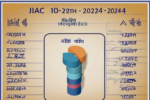Understanding ICMR Guidelines for Tea and Coffee Consumption
In today’s fast-paced world, tea and coffee are two beverages that many people rely on to kick start their day or provide a much-needed energy boost. Beyond their rejuvenating qualities, both tea and coffee have been associated with numerous health benefits. However, the key lies in moderation. The Indian Council of Medical Research (ICMR) has released guidelines regarding the consumption of tea and coffee to ensure that individuals can enjoy these beverages while minimizing any potential health risks. Let’s delve into these guidelines to better understand how to incorporate tea and coffee into a healthy lifestyle.
Background on Tea and Coffee
Tea and coffee are among the most commonly consumed beverages globally. They contain bioactive compounds such as polyphenols, caffeine, and antioxidants that contribute to their various health effects. Research has shown that moderate consumption of tea and coffee is linked to a reduced risk of certain chronic diseases, including cardiovascular issues, diabetes, and neurodegenerative conditions.
ICMR Guidelines for Tea Consumption
The ICMR recommends that individuals consume moderate amounts of tea to reap its health benefits without experiencing any adverse effects. Here are the key points from the guidelines:
1. Ideal Quantity:
- The recommended amount of tea consumption is 3-4 cups per day.
2. Timing:
- Spread out tea consumption throughout the day and avoid consuming it in large quantities at once.
3. Additives:
- Minimize the use of additives such as sugar and milk to avoid excess calorie intake.
4. Variety:
- Opt for different types of tea, such as green tea, black tea, or herbal teas, to benefit from a diverse range of bioactive compounds.
ICMR Guidelines for Coffee Consumption
When it comes to coffee consumption, the ICMR provides specific recommendations to help individuals make informed choices about their daily intake. Here’s what you need to know:
1. Optimal Quantity:
- The recommended amount of coffee consumption is 3-4 cups per day.
2. Caffeine Content:
- Be mindful of your overall caffeine intake from coffee and other sources to avoid exceeding safe limits.
3. Sugar and Additives:
- Limit the addition of sugar, cream, or flavored syrups to control calorie intake.
4. Types of Coffee:
- Choose black coffee or those with minimal additives to maximize health benefits.
Health Benefits of Tea and Coffee
Moderate consumption of tea and coffee can offer several health benefits due to their bioactive compounds. Some of the advantages include:
-
Antioxidant Properties: Tea and coffee are rich in antioxidants that help combat oxidative stress and inflammation in the body.
-
Improved Cognitive Function: The caffeine in tea and coffee has been shown to enhance alertness, focus, and cognitive performance.
-
Heart Health: Regular consumption of tea and coffee may reduce the risk of heart disease by improving cholesterol levels and reducing inflammation.
-
Weight Management: Certain compounds in tea and coffee can boost metabolism and aid in weight loss efforts when consumed as part of a healthy diet.
Common Misconceptions about Tea and Coffee Consumption
Despite their benefits, there are several misconceptions surrounding the consumption of tea and coffee. Let’s debunk a few:
- Myth: Coffee is dehydrating.
-
Fact: Moderate coffee consumption does not lead to dehydration and can contribute to overall fluid intake.
-
Myth: Tea can only be consumed hot.
-
Fact: Tea can be enjoyed cold as well, providing the same health benefits.
-
Myth: Caffeine in coffee is harmful.
-
Fact: In moderate amounts, caffeine can enhance focus and alertness without causing harm.
-
Myth: Decaffeinated coffee offers no health benefits.
- Fact: Decaffeinated coffee still contains antioxidants and other bioactive compounds that can provide health benefits.
Frequently Asked Questions (FAQs)
- Can pregnant women consume tea and coffee according to ICMR guidelines?
-
Pregnant women should consult their healthcare provider before consuming tea or coffee to ensure it is safe for them.
-
Are there any age restrictions on tea and coffee consumption based on the ICMR guidelines?
-
There are no specific age restrictions, but moderation is key for individuals of all ages.
-
Can tea and coffee consumption be beneficial for individuals with diabetes?
-
Both tea and coffee can be included in a diabetic diet, but it is essential to monitor blood sugar levels and avoid excessive sugar or cream additives.
-
Do the ICMR guidelines differentiate between caffeinated and decaffeinated tea and coffee?
-
The guidelines focus on overall consumption rather than differentiating between caffeinated and decaffeinated varieties.
-
Can tea and coffee consumption interfere with sleep patterns?
-
Consuming tea and coffee in the evening or close to bedtime can disrupt sleep for some individuals due to the caffeine content.
-
Are there any specific health conditions that warrant restrictions on tea and coffee consumption?
- Individuals with certain health conditions such as acid reflux, anxiety disorders, or heart arrhythmias may need to limit their intake of tea and coffee.
In conclusion, tea and coffee can be enjoyed as part of a balanced diet when consumed in moderation according to the ICMR guidelines. By being mindful of quantity, timing, and additives, individuals can harness the health benefits of these beverages while minimizing potential risks. Remember, it’s not just about what you drink but how you drink it that matters in the long run.







